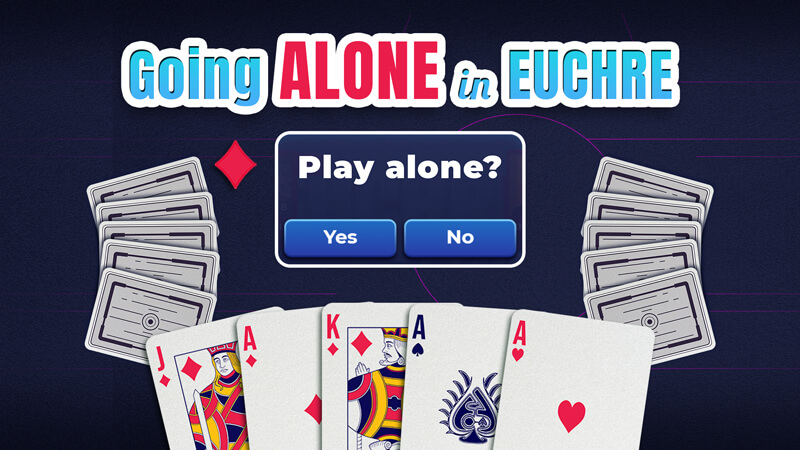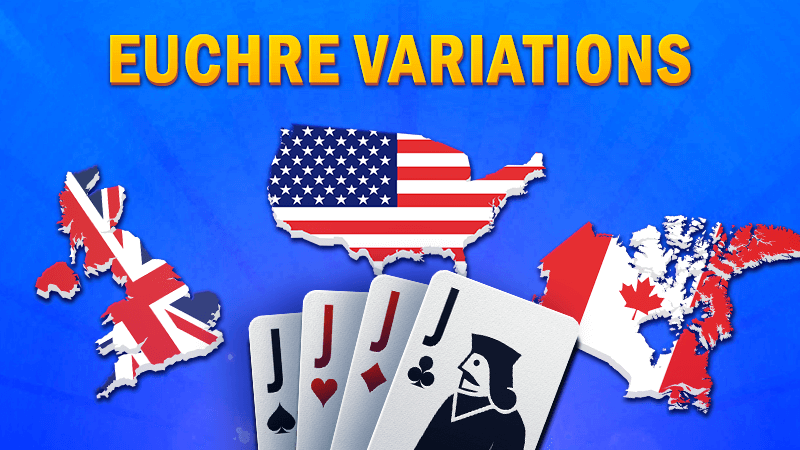Going Alone in Euchre

Generally, Euchre is a team game, with the most widely spread variation being with four players separated into two teams. Going alone, which the Euchre terminology explains as, playing without a teammate, could have different consequences in each variation.
Now, let’s explore these consequences and decide whether it’s reasonable to take the risk.
1. What does going alone in Euchre mean?
2. Who can go alone?
Other players (the defenders) do not have the option to go alone when classic rules apply.
At Euchre.com, players have the unique freedom to create custom games that offer a range of exciting options. One of the standout features available to players is the ability to choose who has the opportunity to go alone in a particular hand – the maker or everyone at the table. When the option to let everyone go alone is selected, it introduces an element of unpredictability and risk-taking into the game, where multiple players have the opportunity to showcase their skills and attempt to win all five tricks on their own.
There is a variation known as Buck Euchre, where there are no teams and each person plays alone.
3. Going alone tips
Evaluate Your Hand: Before declaring “going alone,” carefully assess the strength of your hand. A strong hand for going alone typically includes several trump cards, preferably including the Right Bower (the Jack of the trump suit) and the Left Bower (the Jack of the same color as the trump suit). High cards in other suits can also be valuable for taking tricks.
Consider the Trump Suit: If you have a strong trump suit, it can be a significant advantage when going alone. Trump cards outrank all other suits, so having control of the trump suit is crucial for winning tricks. However, be aware of the possibility that opponents may have strong trump cards as well.
Pay Attention to the Lead Card: As the solo player, you lead the first trick. Consider leading with a high trump card to gain control and establish your dominance in the trump suit. However, if you have a weak hand, leading with a lower trump card or a high card from another suit might be a better option to lure out opponent’s trump cards.
Be Confident: Confidence is essential when going alone. Make decisive plays, but also stay flexible and adapt to changing circumstances.
4. When is appropriate to go alone?
If you have a hand with several high-ranking trump cards (including the Right Bower and Left Bower) and the possibility of taking most or all of the tricks, it’s a good time to consider going alone.
In a game where you’re close to reaching the winning score, going alone can be a strategic move to secure additional points.
If you’re familiar with your opponents’ playing styles and know they tend to underestimate or misplay strong hands, it may be a good time to go alone and capitalize on their mistakes.
In certain situations where your team is far behind and needs a significant number of points to catch up, going alone might be a desperate but necessary move to have a chance of winning the game.
5. How to go alone in three-handed Euchre?
If you’re going alone as the maker, you are the one who chooses trump at the beginning and you always play alone. The other 2 players are a team called the defenders. If the maker decided goes alone, they can’t take any cards from the dummy hand. If you’re going alone as the defender, which you could do before the first card has been played, your partner will not be involved in the round.
Scoring is the same: winning all five tricks earns you four points. Winning three or four tricks earns you two points. No tricks earn no points for you and 2 points for your opponents.
Subscribe to our newsletter for the latest exclusive offers, tournament updates, game strategies, and tips. Join our Euchre community today and never miss a card-playing beat.
Sign up now and let the cards do the talking!
Copyright 2024 All rights reserved
This product is intended for people over 18 years of age for entertainment purposes. This game includes in-app purchases. Practice or success in social casino gambling does not imply future winnings in real money gambling and gambling in general.
Copyright 2024 All rights reserved
This product is intended for people over 18 years of age for entertainment purposes. This game includes in-app purchases. Practice or success in social casino gambling does not imply future winnings in real money gambling and gambling in general.





